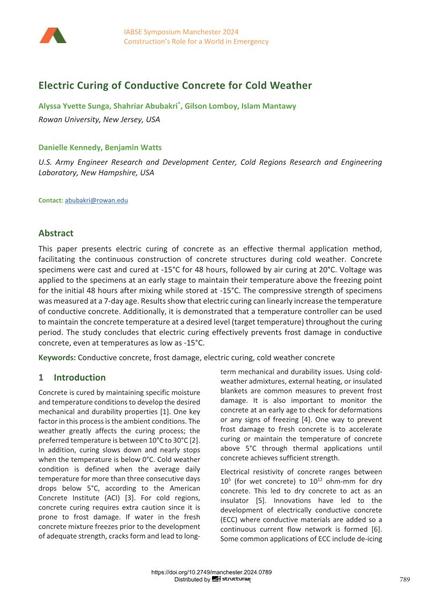Electric Curing of Conductive Concrete for Cold Weather

|
|
|||||||||||
Bibliographic Details
| Author(s): |
Alyssa Yvette Sunga
(Rowan University, New Jersey, USA)
Shahriar Abubakri (Rowan University, New Jersey, USA) Gilson Lomboy (Rowan University, New Jersey, USA) Islam Mantawy (Rowan University, New Jersey, USA) Danielle Kennedy (U.S. Army Engineer Research and Development Center, Cold Regions Research and Engineering Laboratory, New Hampshire, USA) Benjamin Watts (U.S. Army Engineer Research and Development Center, Cold Regions Research and Engineering Laboratory, New Hampshire, USA) |
||||
|---|---|---|---|---|---|
| Medium: | conference paper | ||||
| Language(s): | English | ||||
| Conference: | IABSE Symposium: Construction’s Role for a World in Emergency, Manchester, United Kingdom, 10-14 April 2024 | ||||
| Published in: | IABSE Symposium Manchester 2024 | ||||
|
|||||
| Page(s): | 789-797 | ||||
| Total no. of pages: | 9 | ||||
| DOI: | 10.2749/manchester.2024.0789 | ||||
| Abstract: |
This paper presents electric curing of concrete as an effective thermal application method, facilitating the continuous construction of concrete structures during cold weather. Concrete specimens were cast and cured at -15°C for 48 hours, followed by air curing at 20°C. Voltage was applied to the specimens at an early stage to maintain their temperature above the freezing point for the initial 48 hours after mixing while stored at -15°C. The compressive strength of specimens was measured at a 7-day age. Results show that electric curing can linearly increase the temperature of conductive concrete. Additionally, it is demonstrated that a temperature controller can be used to maintain the concrete temperature at a desired level (target temperature) throughout the curing period. The study concludes that electric curing effectively prevents frost damage in conductive concrete, even at temperatures as low as -15°C. |
||||
| Keywords: |
frost damage conductive concrete electric curing cold weather concrete
|
||||
